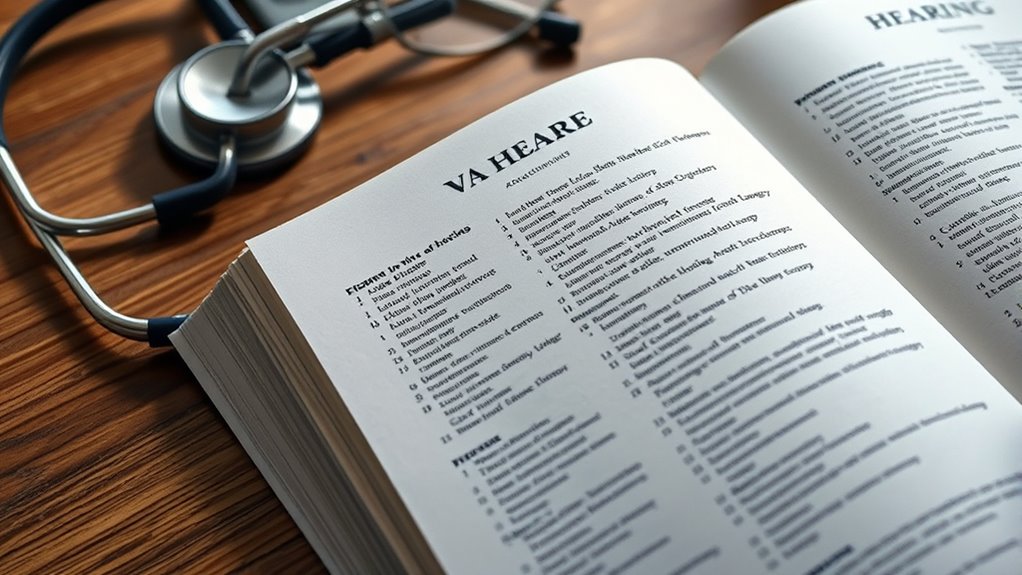Understanding VA hearing-related acronyms helps you navigate your benefits and care more effectively. Terms like HLR (Hearing Loss Ratings) reflect how severe your hearing issues are, while VAS (VA Audiology Services) provide diagnosis and treatment. VDC (Disability Compensation) offers monthly payments for service-related hearing problems. Programs like VHP (Veterans Hearing Program) and VHAP (VA Hearing Aid Program) support hearing health, and VCS (VA Communication Support) helps coordinate your care. Learning these acronyms can guide you through your benefits more confidently.
Key Takeaways
- VA Hearing Loss Ratings (HLR) quantify hearing impairment severity for benefits eligibility.
- VA Audiology Services (VAS) provide diagnosis, treatment, and management of hearing issues.
- VA Disability Compensation (VDC) offers monthly benefits for service-related hearing loss and tinnitus.
- Veterans Hearing Program (VHP) focuses on tailored advocacy and hearing health resources for veterans.
- VA Communication and Support (VCS) assists veterans with appointment scheduling, hearing protection, and service navigation.
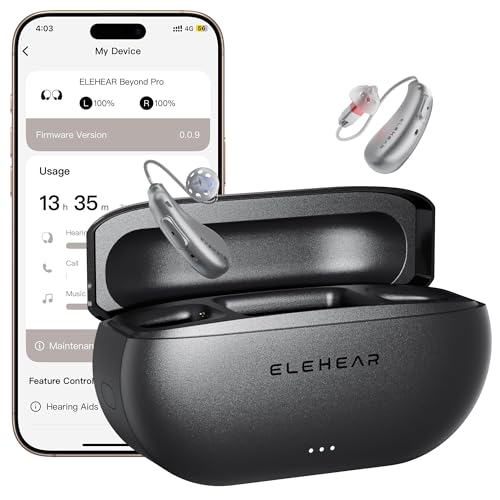
ELEHEAR-Beyond Pro Hearing Aids, Bluetooth OTC Hearing Aids for Seniors and Adults, Premium Sound Algorithm with VocClear 2.0, 30% Clearer Speech, Music Mode & Enhanced App, Bluetooth Streaming
Ultra-clear, Natural Sound – Powered by VocClear 2.0 technology that delivers 30% clearer speech, ELEHEAR-Beyond Pro hearing aids…
As an affiliate, we earn on qualifying purchases.
As an affiliate, we earn on qualifying purchases.
Understanding VA Hearing Loss Ratings (HLR)

Understanding VA Hearing Loss Ratings (HLR) is essential because these ratings determine your eligibility for compensation and benefits. Your HLR reflects the severity of your hearing loss, which influences your treatment options and support. If you experience tinnitus, managing it effectively can improve your quality of life, and your VA rating might consider tinnitus alongside hearing loss. When exploring hearing aid options, your rating helps determine coverage and assistance available through VA programs. Higher ratings typically mean greater benefits, including access to advanced hearing devices and tinnitus management services. Knowing how your hearing loss is evaluated allows you to advocate for appropriate treatments and benefits. Staying informed about your HLR is crucial for understanding how Vetted options like specialized hearing aids and support services can enhance your well-being and ensure you receive the appropriate care and support you deserve.

ELEHEAR-Beyond OTC Hearing Aids, AI Powered Speech Enhancement and Tinnitus Masking, Superior Sound Quality, Connectivity with iOS or Android Devices via Bluetooth 5.3, for Seniors and Adults
Super Clear Sound – Powered by VocClear AI Technology with maximum gain of up to 50 dB and…
As an affiliate, we earn on qualifying purchases.
As an affiliate, we earn on qualifying purchases.
The Role of VA Audiology Services (VAS)
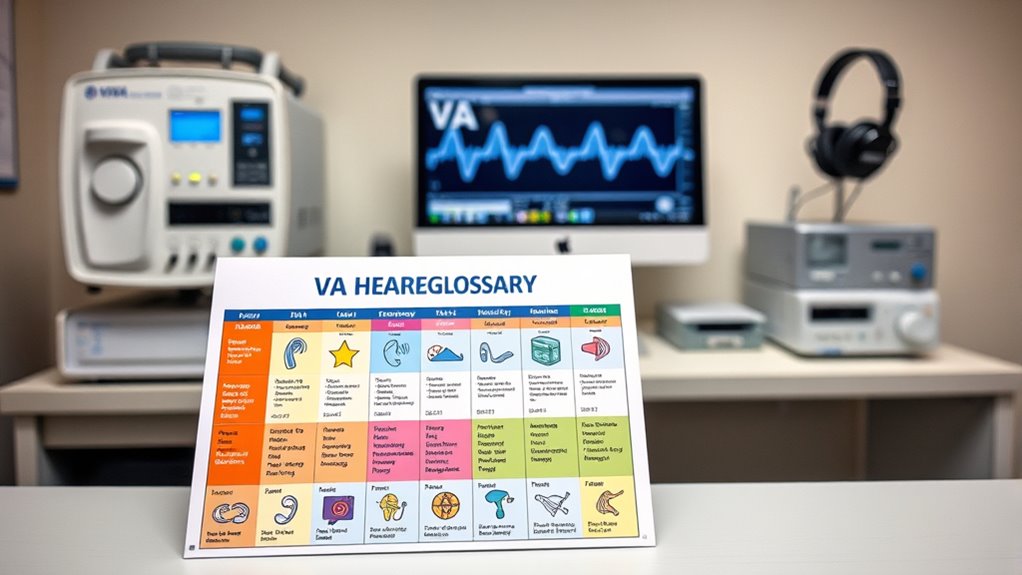
VA Audiology Services (VAS) play a vital role in diagnosing, treating, and managing hearing and balance issues for veterans. These services are indispensable in providing thorough care at veteran hearing clinics, where audiologists conduct detailed evaluations. VAS stays updated with audiology research to offer the latest treatment options, including hearing aids, cochlear implants, and balance therapies. By working closely with veterans, VAS guarantees personalized plans that address specific needs. The goal is to improve quality of life through early detection and effective management of hearing conditions. Floating on Water can also be incorporated into therapy programs to enhance relaxation and recovery. Your access to VAS means you benefit from specialized expertise and innovative solutions rooted in ongoing audiology research, helping you regain better hearing and balance health.

Audien Atom X Hearing Aid Device for Seniors & Adults with Hearing Loss – OTC Bluetooth Hearing Aids w/Charging Case, 48+ Hour Battery Life – Easy Touchscreen Control, Comfortable & Discreet Design
ADVANCED LARGE CLEAR TOUCHSCREEN CONTROL – The Atom X is more than just a hearing aid, it’s an…
As an affiliate, we earn on qualifying purchases.
As an affiliate, we earn on qualifying purchases.
Recognizing the Significance of the VA Disability Compensation (VDC)
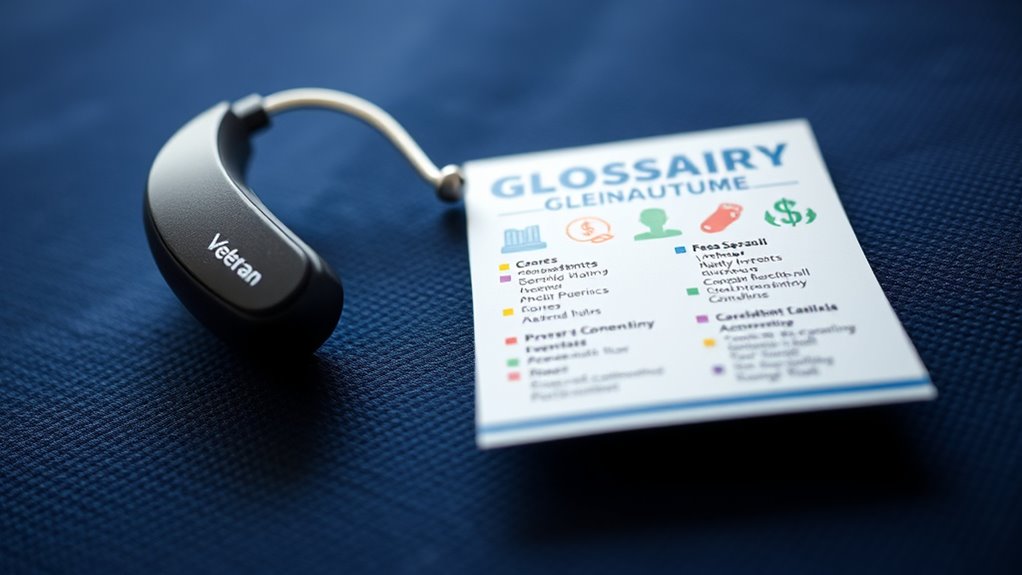
After receiving the specialized care from VA audiology services, many veterans find it equally important to understand how their hearing conditions can impact their financial well-being. The VA Disability Compensation (VDC) recognizes the significance of hearing issues like hearing loss and tinnitus, which often stem from military hearing tests. These conditions can qualify you for monthly benefits that support your needs. By properly documenting your hearing problems, including tinnitus management efforts, you can strengthen your claim. The VDC not only offers financial relief but also acknowledges the sacrifices made during service. Understanding this process helps you navigate your benefits confidently, ensuring you receive the support you deserve for service-related hearing disabilities. Additionally, contrast ratio plays a crucial role in accurately assessing the severity of hearing impairments and their impact on daily life.

Decibullz – Custom Molded Earplugs, 31dB Highest NRR, Comfortable Hearing Protection for Shooting, Travel, Swimming, Work and Concerts (Black)
CUSTOM MOLDED EARPLUGS: Easily and quickly fitted to the exact shape of your ear. This creates a perfect…
As an affiliate, we earn on qualifying purchases.
As an affiliate, we earn on qualifying purchases.
Benefits of the Veterans Hearing Program (VHP)
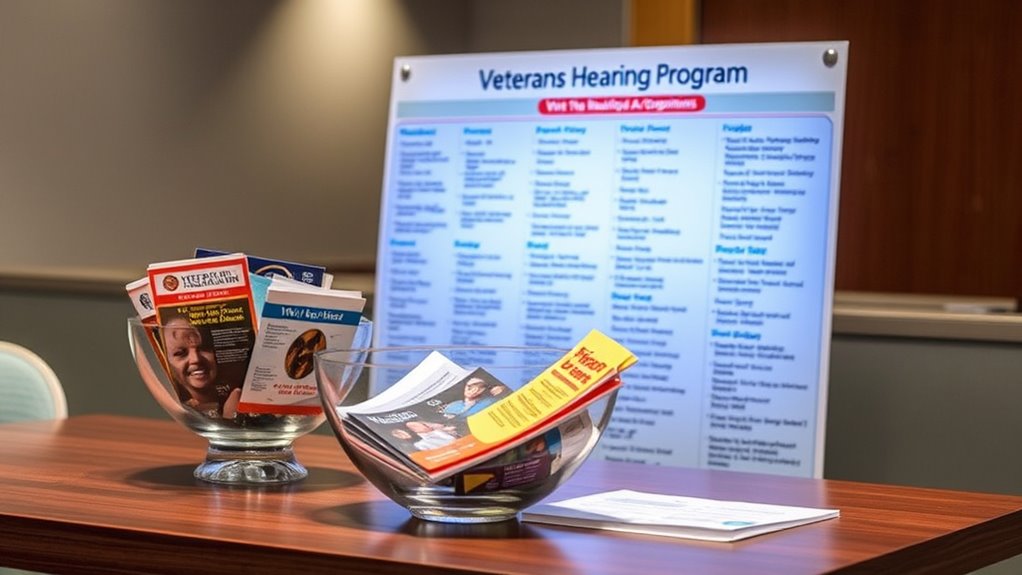
The Veterans Hearing Program (VHP) offers essential benefits that can substantially improve your quality of life. Through tailored hearing health advocacy, VHP helps you access necessary resources and support, making it easier to manage hearing loss. The program also employs effective Veteran outreach strategies to ensure you’re informed about available services, appointments, and hearing aid options. By participating in VHP, you gain access to specialized care and hearing assessments that address your unique needs. This program emphasizes empowering veterans to take control of their hearing health, reducing barriers to treatment. Additionally, VHP stays ahead of emerging trends in digital health and entertainment technology to provide innovative solutions for hearing care. Overall, VHP enhances your ability to communicate effectively and stay connected with loved ones, notably boosting your daily comfort and confidence.
The Purpose of the VA Hearing Aid Program (VHAP)

Are you wondering how the VA Hearing Aid Program (VHAP) can help improve your hearing and quality of life? VHAP’s purpose is to provide eligible veterans with hearing aids to address hearing loss. The program aims to enhance communication, safety, and overall well-being. Through veteran outreach efforts, VA ensures veterans know about available resources and support. Hearing aids are customized to meet your specific needs, helping you reconnect with loved ones and participate fully in daily activities. The program also offers follow-up care and adjustments to maximize your hearing experience. Whether you’re new to hearing aids or need replacements, VHAP endeavors to make hearing health accessible and effective. Regular evaluations and proper device maintenance are essential aspects of ongoing hearing management.
Navigating VA Communication and Support (VCS)

Understanding how VCS roles can assist you makes managing your benefits easier. Knowing the best way to access support guarantees you get help when you need it. Let’s explore how to navigate VA communication channels effectively. Being familiar with for sale 100 options can also help you make informed decisions about your benefits and services.
Understanding VCS Roles
Navigating VA communication and support can be confusing without knowing who’s who, and that’s where the VA Caregiver Support (VCS) plays a vital role. VCS helps you understand your options for hearing protection and guides you through scheduling audiology appointments. They serve as your point of contact for questions about hearing care, ensuring you get the right resources and support. VCS coordinators can connect you with audiologists and other specialists, helping you manage hearing loss or tinnitus. They also provide advice on hearing protection devices to prevent further damage. By understanding VCS roles, you’ll be better equipped to steer through VA services, ensuring timely access to hearing care and support tailored to your needs.
Accessing Assistance Effectively
Once you know the roles of VA Caregiver Support (VCS), the next step is to learn how to access their assistance effectively. Start by reaching out through their dedicated communication channels, such as phone or online portals. When requesting help, be specific about your needs—whether it’s help with assistive technology or mental health support. VCS can guide you on available resources, including assistive devices to improve hearing or support services for mental health. Keep records of your conversations and follow up if you don’t receive a timely response. Remember, VCS is there to help you navigate VA programs smoothly, so don’t hesitate to ask questions and clarify your options for the support you need. Additionally, understanding home organization principles can help you create a more accessible and manageable environment that complements the support services you receive.
Frequently Asked Questions
How Do VA Hearing Loss Ratings Affect Compensation Amounts?
Your VA hearing loss ratings directly impact your compensation amounts. The severity of your hearing loss determines your disability percentage, which is used in compensation calculations. Higher severity ratings translate to higher monthly payments. When your hearing loss is evaluated, the VA assigns a percentage based on the level of impairment. This percentage then influences how much you receive in monthly compensation, ensuring your benefits reflect your hearing loss severity.
What Are Common Challenges Veterans Face With VA Audiology Services?
Think of VA audiology services as a bridge you must cross, but often, you face hurdles like scheduling appointments and hearing aid maintenance. These challenges can delay care, leaving you feeling overlooked. You might struggle to find timely support or proper device upkeep, which affects your hearing health. Overcoming these obstacles requires persistence and clear communication, ensuring you get the care you deserve without unnecessary frustration.
How Can Veterans Track Their Disability Claim Progress Effectively?
To track your disability claim progress effectively, you should regularly check the VA’s online claim tracking system, which provides real-time updates. Keep a record of your appointment scheduling and any correspondence with VA staff. Staying organized helps you stay informed about your claim status, upcoming appointments, and required documentation. This proactive approach guarantees you’re always aware of where your claim stands and can address any issues promptly.
Are There Eligibility Criteria for the Veterans Hearing Program?
Imagine trying to join an exclusive club with a secret handshake—welcome to the veterans hearing program. Veterans eligibility hinges on service-related hearing issues, meeting specific hearing test criteria, and submitting the right paperwork. Hearing program requirements guarantee only those truly affected receive aid. So, if you served and have hearing concerns, check the criteria carefully—you might just open this benefit and finally get the support you deserve.
How Does the VA Communicate Updates About Hearing Aid Programs?
You can stay informed about hearing aid updates through VA communication channels like their website, emails, and direct mail. The VA actively shares information on program changes, new services, and hearing aid options via these channels. To guarantee you don’t miss any updates, regularly check their official website or subscribe to their newsletters. This way, you’re always aware of the latest hearing aid programs and resources available to you.
Conclusion
Now that you know these VA hearing-related acronyms, you’re better equipped to navigate your benefits. It’s almost like the right support was waiting just around the corner—sometimes, understanding the terms opens the door to new assistance. Don’t forget, your hearing health and benefits are connected, and knowing these acronyms could be the key to revealing the support you deserve. So, stay informed—you might find that the help you need was closer than you thought all along.

